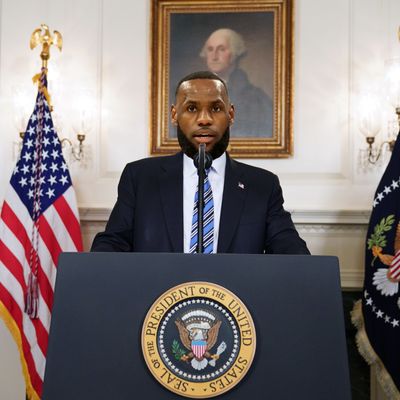
Remember when everyone wanted the Rock to run for president? The general consensus in the wake of 2016 was that if that idiot could win, anybody can — heck, maybe you even required a celebrity to beat him. (This is why Oprah Winfrey is still somehow getting asked if she’s running every time she shows up on someone’s else’s show.) Do not forget that Dwayne Johnson actually played some legitimate footsie with this idea as recently as January, noting that while he didn’t plan on running in 2020, a presidential run was something “he was not ruling out.” And you’d be okay with it, right? If you want to plunk down a few bucks on the Rock to become the next president on PredictIt, he currently has the same odds to win as John Delaney, a man who has spent $18 million and three years of his life running for president. And what is Marianne Williamson other than a celebrity candidate? She has more Twitter followers than anybody else running.
Regardless of what happens in 2020, celebrities seem more likely to run for public office in coming years. (Unless, of course, it turns out that 2020 is the Last Election.) Which begs the question from this sportswriter: Why don’t athletes start running?
Sports figures have run for office before, of course, but it usually involves a minor-to-semi-minor sports figure leveraging their minor celebrity to help them transition to new career — the political equivalent of the retired athlete getting a used car dealership to slap his name on. (This is still going on, albeit with some bigger names: Tim Tebow, Peyton Manning, and recent Trump honoree Mariano Rivera are always having their names tossed around.) Former Washington quarterback and U.S. Representative Heath Shuler is a good recent example of this, as is current Ohio congressman (and former NFL wide receiver) Anthony Gonzalez. (Trump’s former acting Attorney General Matt Whitaker was a tight end for Iowa, and a good one, but he never played professionally and was grooming himself for a political career even when he was starting in the 1991 Rose Bowl.) It’s rare that sports superstars run for office. The biggest names are probably former Oklahoma representative and Pro Football Hall of Famer Steve Largent and Nebraska coaching legend Tom Osbourne, who served as a congressman in his home state. (You can count Bill Bradley and Jack Kemp if you want, but neither one of them much approached sports superstardom.)
But it’s always considered a sort of consolation prize for the athletes, something to attempt to replace the competitive instinct of athletic competition as they get old. It often involves being groomed by party activists (usually Republican) to be, essentially, a bland, smiling, recognizable stand-in willing to vote the party line. We have not seen a player, right at the end of their careers (and thus at the height of their celebrity), flirt with politics, or even run, on the strength of that celebrity alone, save for Charles Barkley, who’s usually just doing it as a goof.
It would seem time, though. There has never been a time when sports and politics have been so inextricably intertwined. From the NFL protests — which not only drew Trump’s ire but came this close to pushing Beto O’Rourke past Ted Cruz last year — to LeBron James and Stephen Curry fighting with the president on Twitter to the equal pay fight with the U.S. Women’s National Soccer Team to Big Macs for unpaid football players in the White House, there is nothing about sports that isn’t politicized anymore. And athletes have begun to realize the power they have. LeBron was one of several athletes who hosted fundraisers for Hillary Clinton and will almost certainly do so again for the eventual Democratic nominee. Megan Rapinoe became a star at the Women’s World Cup as much for her statements off the field as her goals on it. Former WNBA MVP Maya Moore has actually put her basketball career on hold to dedicate her life to criminal-justice reform.
Sports is at the center of every major American issue at this particular moment, from class to race to #MeToo to militarism to labor relations. Simply by being a high-profile athlete, you have an identifiable political platform, whether you want it or not. Tom Brady has always gotten this wrong, thinking you can say nothing in the year 2019 and possibly get away with it. (Not standing for something is a stand.) Megan Rapinoe has a clear, easily understood, deeply compelling political platform already, right now, simply because of what she did and said during the 2019 World Cup. Who has a better rationale to run for president right now: Megan Rapinoe or Bill de Blasio? Who has more to offer the country?
This would seem to be the next step in athlete activism, which has increased so dramatically over the last five years that it is starting to become part of the job description: actually running for office. There are already so many potential voices to choose from, from Patriots defensive end Michael Bennett (who wrote a terrific book with journalist Dave Zirin about his activism for social justice) to recent NFL Walter Payton Man of the Year Award-winner Chris Long (who donated his 2017 salary to scholarships in Charlottesville) to even LeBron himself, who will be 35 in December, making him one of the 10 oldest players in the NBA and in need of something to do soon other than make Space Jam sequels. Athletes have all the benefits of being celebrity candidates but have the benefit of actually being personally affected by the issues they’d be running on. The Rock 2024 may have simple, emotional logic to it. But Rapinoe-James 2024 may make more sense, and may be where all this is headed anyway. The campaign, in a way, has already started.






























